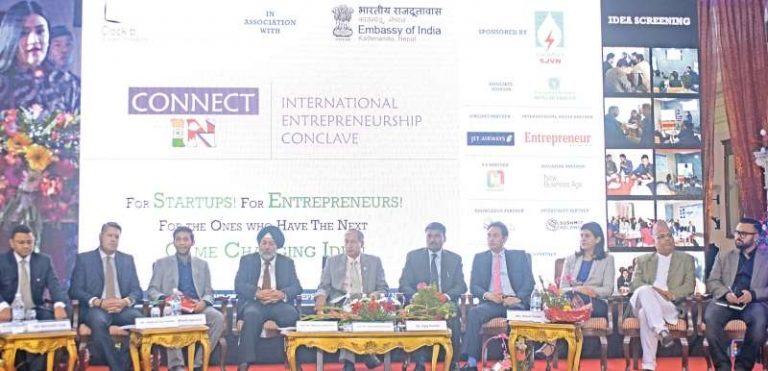Connect IN: Connecting Dots between Nepali and Indian Startup Scenes
At a time when Nepali startups are trying to make footprints in various business sectors, it has become important to connect them with budding entrepreneurs from other countries and various players of the startup ecosystem. Such links can be important enabling platforms for aspiring youths where they can learn from veterans and experts, share ideas and experiences that can help them to solve problems and come up with something new to realise their entrepreneurial ambitions. Besides, the government can also identify problems and provide policy level support.
One such endeavour, The International Entrepreneurship Conclave – Connect IN, was held on March 24 in the capital. Organised by the Embassy of India in Nepal in association with Clock b Business Innovations, a Nepali firm specializing in startup business consulting, the one-day programme brought together over 400 Nepali and Indian startup entrepreneurs, investors, venture capitalists, aspiring youths, experts, high ranking Nepali and Indian government officials and representatives from media.
Addressing the programme, chief guest finance minister Dr Yuba Raj Khatiwada said that the government is ready to support the startups to make their efforts more innovative and effective. “The advancements in technology has made easier for the youths to come up front and realise their ideas,” he mentioned.
Manjeev Singh Puri, Indian Ambassador to Nepal noted the efforts of Nepali youths in utilising new technologies to make the lives of people easier. “Nepal is a country with amazing technological minds. Recently, Nepal SBI Bank deployed a robot developed by Nepali engineers at its Durbarmarg branch. The robot shakes hand, takes order from the customers, and does other amazing things,” he said. The Indian envoy suggested the government focus on ways to motivate youths to stay in the country. “The large young population is Nepal’s biggest asset. The government should seriously think of facilitating startup businesses rather than just urging youths to just stay in the country without building proper infrastructure,” Puri expressed.
The panelists of the conclave energetically discussed various issues related to the startup ecosystem in Nepal. The discussion also highlighted how Nepali stakeholders can learn from the growth of the Indian startup ecosystem. The event also hosted a pitching session where five promising startups presented their businesses and ideas.
Understanding Entrepreneurship in a Developing Country
Known as “agents of change” the world over, entrepreneurs are the ones who create jobs and contribute to the economic development of countries. Besides being growth-oriented in business, one of the key responsibilities of the entrepreneurs in the developing nations should be towards improving the lives of the needy. The conclave’s speaker Sixit Bhatta, co-founder and CEO of Tootle highlighted on the role of entrepreneurs in the developing countries to bridge the gap between the haves and have nots. “This is important because half of humanity lives in Asia, but the products created here are for mostly for the top-end players in the economic spectrum. Now, it is time to focus on the consumers at the bottom-end of the pyramid. In this way, entrepreneurship will be more impactful in bringing economic equality,” shared Bhatta.
Narottam Aryal, Executive Director of Kings College talked about optimal utilisation of available resources and gaining knowledge of the country’s strengths to have comparative business advantage. He gave the example of Sherpa Adventure Gear, a Nepali brand which manufactures garments and accessories for trekking and mountaineering reaching out to adventure tourism enthusiasts from across the world. “In this way, entrepreneurs should focus on the unique points of the market and gradually make the global moves,” mentioned Aryal.
Siddhant Raj Pandey, CEO of Business Oxygen said that businesses in Nepal can have a greater degree of leverage due to the low level of costs associated with the imitation of international products, legal fees and labour. “All these factors contribute to the low cost of failure in terms of doing business in Nepal,” he opined.
Amit Agarwal, CEO and Director of Janaki Technology focused on being collaborative and working together for fostering financial inclusion in the country. “There is 100 per cent mobile service penetration in Nepal. However, the penetration of digital payment is relatively very low as banks as well as consumers are yet to fully adopt and start practices in the electronic payment system. A single player cannot fill all the gaps in the ecosystem because there are many verticals in the payment industry. So, we need more innovative ideas and great teamwork to work on a greater vision in the market,” he said.
Inspiring and Motivating the Youths
Connect IN became a prime platform for many attendees to draw inspiration from Nepali and Indian entrepreneurs who shared how they dared to take on the challenges and grow through adversities in their entrepreneurial journeys. Their stories were about passion, hard work and a commitment to fight the odds, especially since the start of any entrepreneurial journey is hard for most and one should also not be afraid to fall back and get up again in order to succeed. Kaushik Mukherjee, co-founder and managing Director of Fab Bag stressed on the importance of perseverance in any entrepreneurial journey. “People simply hear when the ventures become successful. However, there are lots of pictures of struggle which only the founders and the initiating team members have seen,” said Mukherjee. He emphasised on building financial endurance and emotional independence while embarking on any entrepreneurial voyage. “People will take time to support you. So you need learn to manage your emotions,” he expressed.
“Between a huge firm and a growing startup which one will win the market race depends on whether the big company and young venture get innovation and distribution first,” he said, adding, “In India, you can now see a huge trend of cashless payment. It’s just a matter of time before it arrives here. So, start building appropriate products for three years later.” Yatin K Thakur, founder of Startup India talked about the importance of becoming a good salesperson in order to achieve success as an entrepreneur. Shedding light on the significance of having a good level of networking, Thakur who stepped into the field of business at the very young age of 16 shared his experience of how going to different events and connecting with people helped him to expand his clientele in a relatively short time.
In this digital age, where answers to every query are widely available over the internet and where many courses can be attained online, formal education is no more a detrimental factor for initiating a startup business. “You need to learn from your life experiences, by taking risks and by creating an impact,” opined Ritesh Agarwal, founder of OYO Rooms.
Pre-event Activities
Before the main event of Connect IN, the organisers arranged various gatherings, college level activities, social media campaigns, mentorships and selected five startups for the final day pitching. According to Binay Devkota, CEO of Clock B Business Innovations, over 300 applications were received from which 29 startups were selected. Five startups, namely Furniture Hub, My Earth Eco Bag, Kullabs, Metro Tarkari and Fohor Bata Mohor got the opportunity for the final day pitching. “All business ideas presented before us had high potential and seemed impactful. So, rather than ranking the ideas, evaluated on the basis of investment readiness, investors preference and background of the founders,” informed Devkota. “The present day startups have well internalised the value proposition of business. Nevertheless, there is still a considerable lack of understanding of team growth and the revenue model. It is high time we work on these missing links,” he observed.
Turning Challenges into Opportunities
In Ritu Marya’s view, Nepal is a land of immense possibilities. “Nepal may be a challenging market for many investors. But, I think it as a ‘hungry market’,” said Marya who is the editor-in-chief of the Indian edition of Entrepreneur magazine. She focused on the importance of creating brands in order to give credibility to a venture’s identity and its products. “People prefer branded products and services. So it is necessary to create brands,” she mentioned. Marya suggested entrepreneurs should tap into the opportunities in MICE (meetings, incentives, conferencing and exhibitions) which can be a lucrative sector for a naturally prosperous country like Nepal.
“No matter which market it is, people of the same age, similar experiences, passion are struggling on both sides of the border. So, entrepreneurs should first be ready to move out of their comfort zones to create local and international opportunities. The systems, policies and structures of both countries are becoming supportive with this increasing trend,” said Kapidhwaj Pratap Singh, second secretary at Embassy of India in Nepal.
Removing Legal Bottlenecks
Siddhant Raj Pandey pointed out some of the legal bottlenecks including IPR in Nepal. “Proper legal frameworks are essential to address the challenges that are surfacing due to technological advancement,” said Pandey. Meanwhile, Semanta Dahal, advocate and partner at Abhinawa Law Chambers stated simplicity of language as a key feature of laws in Nepal which makes things easier for the entrepreneurs. “The laws in the United States and other developed countries are written in much detailed manners. But here the laws are simpler and can be understood by everyone,” he opined.
Source: https://www.newbusinessage.com/MagazineArticles/view/2124






